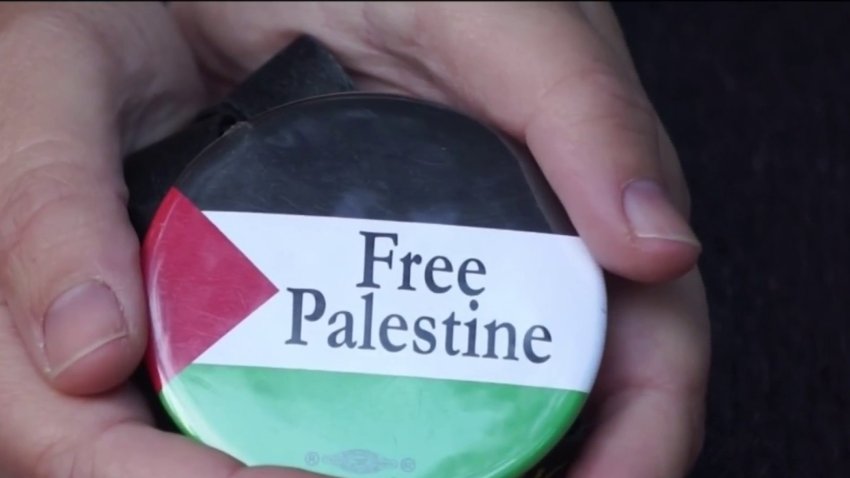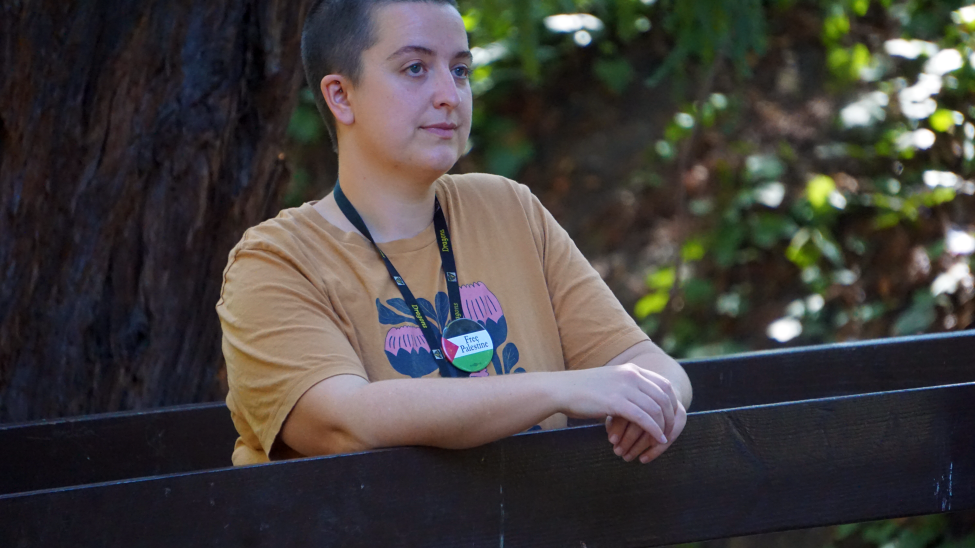Oakland teacher fired for wearing ‘Free Palestine’ pin
Bishop O’Dowd High, a private Catholic school in Oakland, fired an English teacher for “insubordination” after she refused to stop wearing a pin bearing the Palestinian flag and the words “Free Palestine”
By Bigad Shaban, Michael Bott, Michael Horn and Alex Bozovic • Published November 17, 2024 • Updated on November 19, 2024 at 9:46 am
To watch video report, Click Here.

Bishop O’Dowd High, a private Catholic school in Oakland, fired an English teacher for “insubordination” after she refused to stop wearing a pin bearing the Palestinian flag and the words “Free Palestine.” Bigad Shaban reports.
After refusing to heed the principal’s demands to stop wearing a “Free Palestine” pin on campus, a freshman English teacher was fired from Bishop O’Dowd High School in Oakland this summer, highlighting how the war in Gaza is testing the limits of free speech in the workplace and across academia.
Erin Donevan, who’s worked as a teacher for much of the last decade, said the year-long war in Gaza – and what she described as an ongoing genocide – prompted her to put on the pin last April, in part as a sign of solidarity with students who may be grieving.
“I wore it on my lanyard just as a way to kind of let students know that I was a safe person to talk to if they wanted to speak about it, because there really weren’t any other spaces where I felt like the conversation was welcome,” Donevan said.
While she donned the circular pin at school – with the words “Free Palestine” printed over a background of the Palestinian flag – the long-time teacher said she never taught about the ongoing conflict in class or told students how they should think about it.
School told teacher to remove pin, citing “discomfort” among students
Donevan said she is speaking out now to hold the school accountable “for their problematic behavior,” but said she’s reluctant to complain about her own termination among an ongoing humanitarian crisis in Gaza.
“It feels weird to even just be talking about being fired,” Donevan said. “There are teachers in Palestine who have lost their jobs not because of a pin, but because their schools no longer exist, because their students are dead, because the teachers themselves have been experiencing unfathomable violence.”
Donevan’s trouble with the school’s administration began the day after she first wore the pin to school, when the mother of one of her students complained in an email to school principal Dr. Doug Evans.
“I wish a statement as simple as those two words weren’t so politically and socially charged but as a Jewish Zionist family with very close ties (and family) in Israel, this is not what I expect my son to see at school,” the mother wrote in her email, a copy of which Donevan provided to NBC Bay Area. “[Redacted] is afraid that he will get in trouble or the teacher won’t like him for speaking up about this but I’m glad he mentioned it to me. Is there a policy about political messages on lanyards? If this in alignment with O’Dowd policy, please let me know.”
In response to the parent’s concerns, Evans forwarded the parent’s email to Donevan, along with a request that she “refrain” from wearing the pin on campus.

Teacher explains why she refused to take off pin
After careful consideration and a review of the school’s policies, Donevan told Evans she planned to continue wearing the pin and outlined why she thought its message was in line with the school’s stated values. She also pointed out that she never taught about the conflict in her classroom.
“While this choice feels scary and uncomfortable for me, it is the only choice that allows me to stay in ‘integrity with self and others,’” Donevan wrote. “It is the only choice that is ‘built on truth and expressed in loving action guided by an informed conscience,’” Donevan wrote while quoting the school’s published statements on its mission and values.
Over the following month, emails show Evans continued to insist Donevan remove the pin, telling her the school had received additional complaints from students in her class.
Donevan described the school’s demands as “hypocritical,” pointing out that the school and its faculty have a history of embracing political and social causes, such as the Black Lives Matter movement, LGBTQ rights, repatriation of indigenous land, and support for Ukraine in its war with Russia.
“All of these things are deeply political and so it’s problematic when there’s no real clear policy that says what is ‘political’ and what is ‘social justice,’ and how are we deciding what things are OK to take a stand on and what aren’t?” Donevan said.
When asked why she didn’t remove the pin if it made some students feel uncomfortable, Donevan rejected the idea that learning should always make students feel at ease.
“I take issue with this idea that classrooms are supposed to be places where we feel comfortable,” Donevan said. “If you are learning something, you are feeling discomfort. It’s hard. It’s vulnerable.”
Bishop O’Dowd High School did not respond to interview requests
Bishop O’Dowd never responded to NBC Bay Area’s interview request to discuss Donevan’s termination. However, in emails to Donevan, Evans wrote, “as a private school, Bishop O’Dowd High School has significant discretion to regulate employee speech.”
“Teachers…have repeatedly been advised to maintain neutrality on controversial issues as professionals with positional power over young students,” he also wrote.
Donevan, however, said she never taught or discussed the war in her classroom, let alone tell students how they should think about it.
“There’s a difference between students knowing that you have an opinion and that you have a stand on something, and you explicitly teaching them that,” she said. “And I wasn’t explicitly teaching anything.”
In June, Donevan was summoned to a meeting with Evans and the school’s human resources director, emails show, where the English teacher was given a final ultimatum: agree to stop wearing the pin or be fired for insubordination.
Again, she refused. Her termination letter came the following day.
Last year’s Oct. 7 attack on Israel
It was just over a year ago when Hamas attacked a music festival and surrounding villages in Israel, killing some 1,200 people and kidnapping more than 250 others, according to the U.S. State Department. Palestine’s health ministry says Israel’s ensuing military response has killed more than 40,000 people and has decimated much of Gaza.
The war raging abroad continues to test the boundaries of free speech here at home. Earlier this year, pro-Palestinian demonstrations and encampments blanketed college campuses, at times, leading to clashes with law enforcement.
Conflict abroad sparks discussion on free speech limitations in workplaces and schools
Top university leaders have been summoned to appear before Congress and chastised over their handling of protests, with some ultimately forced to resign. More than a year into the war, schools and workplaces are still grappling with how to let students and employees express themselves without creating an environment that leaves some feeling unsafe.
“To me, it’s sort of contrary to the educational mission of the institution to say certain political viewpoints are out of bounds,” said David Sloss, a constitutional law professor at Santa Clara University, who has been tracking the impact of those widespread student protests.
Some schools have since adopted rules to limit protesting, by banning encampments and restricting campus access to only students and staff.
“From the university standpoint, they’re trying to minimize the risk of disruption, but maybe that goes too far,” Sloss said.
While public universities and institutions are largely prohibited from infringing on a person’s right to free speech, private employers have significantly more leeway to set their own rules.
“What are they trying to shield their students from?” asked Zahra Billoo, Executive Director of the Council on American-Islamic Relations San Francisco Bay Area office, about Bishop O’Dowd’s administration. “I am so inspired by this teacher who took a professional and career risk to speak out for human rights.”
Advocacy groups on both sides of the Israel-Palestine conflict report spikes in complaints from U.S. employees who say they’ve been made to feel uncomfortable in the workplace because of their stance on the war in Gaza.
“They are working in fear,” Billoo said. “They are looking for new jobs, and in some cases, they’re facing termination.”
Tyler Gregory, CEO of the Jewish Community Relations Council, said he’s heard similar concerns from the Jewish community.
“We need to make sure that the psychological safety of Jews and Muslims in a variety of settings are accounted for and that they feel like they belong,” Gregory said. “What we need to do is create an environment where those folks who are dealing with active trauma right now feel safe,” he said.
Gregory suggested that if all sides can’t be equally heard, then in some situations, it might be best for employers to restrict political speech altogether.
“We’re discouraging political statements or pins or one-sided content or curriculum that could make folks feel alienated in classrooms, in businesses, in city halls,” Gregory said. “We think that everyone should have a right to bring their full identities, including teachers, including faculty, but those political button-pushing ideas really create tension and inflame the problems that we’ve seen play out across the Bay Area.”
While Billoo said she supports the rights of employees to express themselves at work in most situations, she said a broad policy prohibiting political statements is better than allowing support for some causes, while cracking down on others.
“One way this school and any other employer can simplify things is by saying, ‘we won’t allow any pins,’” Billoo said. “We wouldn’t be having this conversation if they hadn’t been inconsistent.”
Donevan still finds it confusing, she said, that as an openly queer woman, teaching at a private Catholic high school, what ultimately got her fired was her support of a war-torn country more than half a world away.
For the one of the only times over the past decade, Donevan doesn’t have a class to teach, and she wonders if her former students even know why she didn’t return this past fall.
“There’s a lot of grief for me around not having closure with any of my students,” she said.
“What’s actually concerning is that we live in a world in which saying that hundreds of thousands of people should not be dead is a problematic, scary thing to say that you can lose your job over.”